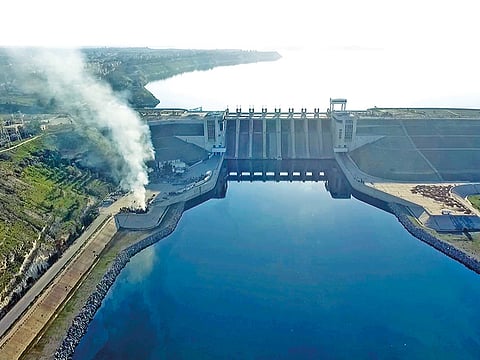Russia general claims US-led coalition hit dam in Syria
Daesh launches attacks to defend north Syria town: monitor

Moscow/Beirut : A senior Russian general on Tuesday criticised the US-led coalition fighting Daesh militants for allegedly targeting infrastructure — including a key dam — in territory held by the extremist group in Syria.
Col Gen Sergei Rudskoi of the military’s General Staff accused the coalition of trying to “completely destroy critical infrastructure in Syria and complicate post-war reconstruction as much as possible.”
Rudskoi further claimed that coalition jets had destroyed four bridges over the Euphrates River in Syria and hit the Tabqa dam to the west of the extremists’ de facto capital of Raqqa.
Rudskoi said that the collapse of the dam would case an “ecological catastrophe” and lead to “numerous” civilian deaths.
The US-led coalition says it is taking every precaution to ensure the integrity of the dam. “To our knowledge, the dam has not been structurally damaged,” it said on its Twitter account on Monday.
A spillway north of the structure is under control of the US-backed and Kurdish-led opposition group known as the Syrian Democratic Forces, and can be used to relieve pressure behind the dam, the coalition told the Associated Press in an email on Sunday.
Engineers who used to work at the site have expressed doubt that the spillway could accommodate the water flow but said it will still take at least a month for the lake to reach critical levels if the gates are not opened.
Daesh has warned that the dam’s main gates are out of service, causing water levels to rise behind the levee.
Pressure on Daesh has intensified in recent months as the group has seen a series of battlefield reverses amid Syria’s bloody 6-year civil war.
Rudskoi said Tuesday that Syrian government forces, with Russian military assistance, are making progress against Daesh. Russia has been a main backer of Syrian President Bashar Al Assad and has played a key role in turning the tide of war in his favour.
Syrian forces now control territory up to 16 kilometres around the historic town of Palmyra, Rudskoi said, and they have recently seized control of high ground held by Daesh along a highway connecting Palmyra and the capital, Damascus.
Syrian troops fully recaptured Palmyra earlier this month after a push that saw the Daesh’s defences crumble and their fighters flee in the face of artillery fire and intense Russia-backed air strikes. The Syrian government had seized the town from Daesh militants last March, only to lose it again 10 months later.The Daesh group launched a counter-attack Tuesday against US-backed fighters closing in on a key terrorist-held town of Tabqa, a monitor said.
“The fighting is a result of Daesh launching a counter-offensive to exhaust the Syrian Democratic Forces around the Tabqa military airport,” said Syrian Observatory for Human Rights head Rami Abdul Rahman.
The battle for Tabqa is a major part of the SDF’s flagship campaign for the city of Raqqa, the Syrian heart of Daesh’s so-called “caliphate”.
Backed by the US-led coalition bombing Daesh, the SDF seized the Tabqa airbase late Sunday and began pushing north.
Abdul Rahman said the SDF, an alliance of Kurdish and Arab forces, was working to “consolidate its positions” near the airport ahead of a final push for the town.
Meanwhile Syria has received 50,000 tonnes of Russian wheat as humanitarian aid, Syrian and Russian government sources said on Tuesday. The two cargoes arrived in March, they said.
However, no Russian wheat from the commercial deals signed with state grain buyer Hoboob have arrived yet, the Syrian government source said. The Russian Agriculture Ministry declined to comment.
Russian government officials said in November their country plans to send around 100,000 tonnes of wheat as aid to Syria.
A deal struck in October for Syria to buy 1 million tonnes of Russian wheat with little known firm Zernomir is in jeopardy,according to Syrian and Russian government sources, after Hoboob failed to receive any grain from the deal.
Also no wheat has arrived under another deal struck with local Syrian wheat traders in February for 1.2 million tonnes of Russian wheat.
“We have received nothing from these two deals yet,” the Syrian government source said.
— AP, AFP & Reuters
Sign up for the Daily Briefing
Get the latest news and updates straight to your inbox

